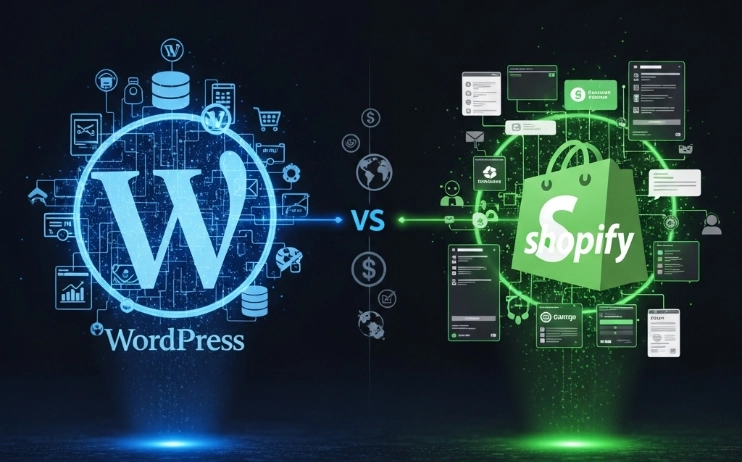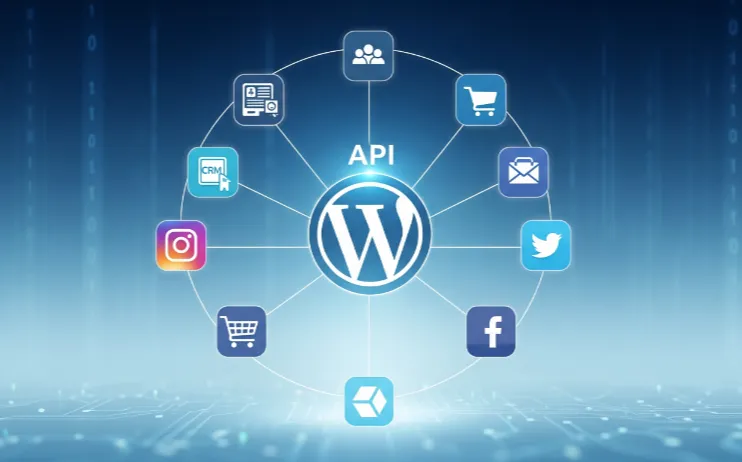If you’re looking to launch or scale an online store, you’ve likely come across two dominant names in the E-commerce world: WordPress (with WooCommerce) and Shopify. Both platforms promise to help you sell online, but beneath the surface, they offer fundamentally different approaches to building your digital storefront. Now WordPress vs Shopify.
Choosing between them is one of the most critical decisions you’ll make for your business. It impacts everything from your monthly costs and customization options to your long-term scalability and overall control. There’s no single “better” platform; there’s only the platform that’s right for your specific business needs, goals, and technical comfort level.
As a website developer specializing in both e-commerce solutions and WordPress Development, I’ve worked extensively with both. I understand the strengths and weaknesses of each from a practical, business-driven perspective. This guide will provide a clear, unbiased comparison to help you make an informed decision and set your online store up for success.
The Quick-Start Solution: Why Business Owners Love Shopify
Shopify has carved out a massive niche by offering an all-in-one, hosted e-commerce solution that emphasizes ease of use. It’s often lauded as the go-to for those who want to get an online store up and running quickly with minimal technical hassle.
The Pros of Shopify
- Ease of Use & Quick Setup: Shopify is designed for simplicity. Its intuitive interface allows even beginners to set up a basic store, add products, and start selling quickly. There’s no need to worry about servers, installations, or manual updates.
- All-in-One Hosted Solution: Shopify handles all the technical aspects for you, including Hosting, security (SSL certificates are included), and updates. This “set it and forget it” approach appeals to many business owners who want to focus purely on sales and marketing.
- Dedicated Support: Shopify provides 24/7 customer support via phone, email, and live chat, which can be invaluable for new entrepreneurs.
- App Store Ecosystem: Shopify has a robust app store with thousands of add-ons to extend functionality, from marketing tools to shipping solutions.
- Security & Maintenance Included: With Shopify, security updates, backups, and server maintenance are all handled by the platform, reducing your operational burden.
The Cons of Shopify
- Monthly Subscription Fees: Shopify operates on a subscription model, with plans ranging from basic to advanced. These fees are ongoing and can increase as your business grows or you need more features. Transaction fees also apply if you don’t use Shopify Payments. You can review their pricing at Shopify’s official website.
- Limited Customization & Control: While Shopify offers themes and an app store, the level of deep customization is limited compared to an open-source platform. You’re working within Shopify’s ecosystem and its rules. If you need highly specific functionality or a truly unique design that deviates from templates, you might hit a wall.
- Ownership of Your Store: You don’t “own” your Shopify store in the same way you own a self-hosted WordPress site. You are essentially renting space on their platform. If you stop paying, your store goes offline. Migrating off Shopify can also be more complex.
- App Costs Can Add Up: While there are many free apps, the most powerful ones often come with additional monthly subscription fees, which can quickly inflate your overall operating costs.
The Ultimate Powerhouse: Why Developers and Scaling Businesses Prefer WordPress + WooCommerce
WordPress, combined with the free WooCommerce plugin, transforms a content management system into a full-fledged, highly customizable e-commerce powerhouse. It’s the engine behind over 36% of all online stores, making it the most popular e-commerce platform globally.
The Pros of WordPress + WooCommerce
- Complete Ownership & Control: With WordPress, you own your website and all its data. You have complete control over every aspect of your site, from code to content, giving you unparalleled flexibility.
- Endless Customization: This is where WordPress truly shines. With thousands of themes (many specifically designed for WooCommerce) and plugins, you can customize virtually anything. From a unique Website Design that perfectly reflects your brand (check out our Projects/Websites to see examples) to highly specific features built through Plugin Development, WordPress offers limitless possibilities.
- No Monthly Platform Fees (WooCommerce is Free): The WordPress software and the WooCommerce plugin are both free. Your main costs will be for Hosting, your domain name, and any premium themes or plugins you choose. This can lead to significant cost savings in the long run, especially as your business scales.
- Superior SEO Capabilities: WordPress is inherently SEO-friendly, and with powerful plugins like Yoast SEO or Rank Math, you have granular control over your optimization strategy. This allows for deep Website Optimization to rank higher in search results.
- Vast Ecosystem & Community: WordPress boasts an enormous global community of developers and users. This means abundant resources, tutorials, and support available online.
- Scalability: WordPress can scale from a small boutique to a massive enterprise-level store. With the right hosting and optimization, it can handle immense traffic and product catalogs.
The Cons of WordPress + WooCommerce
- Steeper Learning Curve: While user-friendly, setting up a WordPress and WooCommerce store requires more technical involvement than Shopify. You’ll need to install WordPress, choose a theme, install WooCommerce, and configure various settings. This is where a professional WordPress Development partner becomes invaluable.
- Requires Self-Management: You are responsible for your own Hosting, security, and updates. While this offers control, it also means more responsibility. However, this is precisely where services like Rudtek’s Web Security & Hardening come into play, taking this burden off your shoulders.
- Potential for Plugin Conflicts: With thousands of plugins available, there’s always a risk of conflicts or compatibility issues if not managed correctly. Choosing reputable plugins and having a developer assist with integration is key.
Head-to-Head: WordPress vs. Shopify Comparison Table
To help summarize, here’s a quick comparison of key aspects:
| Feature | Shopify | WordPress (WooCommerce) |
| Ease of Use | Very high (all-in-one, hosted) | Moderate to High (requires more setup) |
| Cost | Monthly subscription + app fees + transaction fees | Hosting + domain + optional premium themes/plugins |
| Customization | Limited to theme options & apps | Unlimited (open-source code access) |
| Control | Shopify controls platform, updates, features | You control everything (code, data, updates) |
| Scalability | Good, but higher-tier plans get expensive | Excellent, with proper hosting & optimization |
| SEO Control | Good, but less granular | Excellent, with full control and dedicated plugins |
| Security | Handled by Shopify (included in subscription) | Your responsibility (or with a professional partner) |
| Hosting | Included | You choose/manage (separate cost) |
The Rudtek Recommendation: How to Choose What’s Right for You
So, which E-commerce platform is the right choice for your business?
- Choose Shopify if: You need an absolute “set it and forget it” solution, want to launch very quickly with minimal technical involvement, and are comfortable with ongoing subscription fees and less customization control.
- Choose WordPress + WooCommerce if: You want complete ownership and control over your website, require deep customization to build a unique brand experience, prioritize long-term scalability without platform-specific limitations, and are looking for a more cost-effective solution in the long run.
At Rudtek, our expertise shines with WordPress + WooCommerce. We specialize in building custom, high-performance, and secure online stores that give you the ultimate control and flexibility. We take the “cons” of WordPress (the learning curve, the self-management of Hosting and Web Security & Hardening) and turn them into “pros” by handling them for you.
We provide the professional WordPress Development, Website Design, and ongoing Website Optimization to ensure your E-commerce store is not just functional but a powerful, scalable asset for your business. You get the power and flexibility of the world’s leading open-source platform without the headaches. Our Projects page showcases some of the successful online stores we’ve helped create.
What’s Next?
Choosing your e-commerce platform is a foundational decision that impacts your entire online business. We hope this comparison has provided clarity!
- Which platform’s pros and cons resonate most with your current business needs?
- What’s the single most important factor for you when choosing an e-commerce platform (e.g., ease of use, cost, control)?
- Are there any specific features you need that you’re unsure if both platforms can support?
Share your thoughts in the comments below! If you’re ready to build a powerful, custom online store with the flexibility and control that WordPress + WooCommerce offers, don’t hesitate to contact Rudtek today. Let’s discuss your vision and create an e-commerce solution that perfectly fits your business goals.






